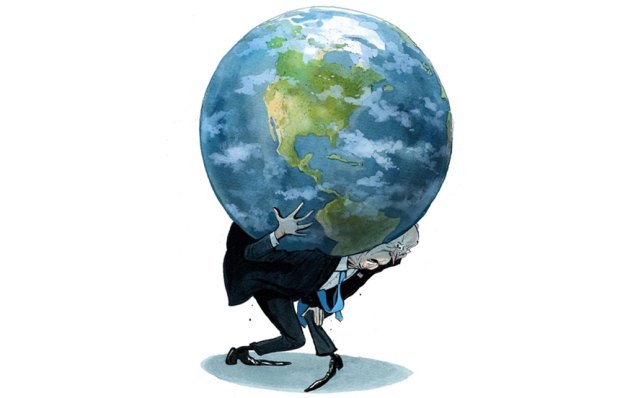Comparing Saturday’s Downing Street press conference to Groundhog Day would insult one of my favourite films. The hilarious, multifarious strategies our cinematic protagonist employs to repeatedly negotiate the same day in February are anything but monotonous. No. 10’s top-down strategies for containing Covid are always the same. That press conference seemed like a cheap Chinese knock-off video of Groundhog Day, one that only shows a clock radio playing ‘I Got You Babe’ at 6 a.m. over and over. Phil Connors never punches Ned Ryerson in the gob.
What a shock: the coronavirus has spun off another variant. Battle stations, everyone. The PM warns that Omicron — evocative of an Arnold Schwarzenegger thriller more than a Bill Murray romcom — ‘can be spread between people who are double vaccinated’, which could seem alarming, save for the fact that the vaccinated communicate all the other variants, too. Omicron ‘might’ evade the protection of vaccines; then again, our planet ‘might’ be blitzed to smithereens by an asteroid tomorrow. Besides, the logic is a bit warped, isn’t it? Our weary public-health superheroes don’t trust the vaccines to protect against this terrifying new kryptonite. Restored restrictions are therefore meant to ‘buy time’ to administer even more of the very vaccines they’ve little faith in.
Regarding the variant’s transmissibility or virulence, our overlords have virtually no information, which hasn’t stopped them from acting on it. (South African doctors’ reports of Omicron’s unusually mild symptoms — fatigue and headache — seem to have made no impression.) Here we go again. Yet another ‘variant of concern’. Yet another return of restrictions. Yet another promise to ‘review’ these impositions in three weeks, which if history serves will mean increasing restrictions in three weeks and maintaining them almost indefinitely. Yet another promise that Christmas is safe, and nothing makes my heart sink like this administration’s reassurances. Yet another collective call from journalists in the audience for still more oppressive measures — for vaccine passports, renewed hospitality check-ins and working from home: You’re sorely remiss, sir, for not making life crap enough! Yet another synchronous plummet in international stock markets, from fear not of the variant itself, but of governmental overreaction to the variant. How many times is ‘I Got You Babe’ going to play at 6 a.m.?
Chris Whitty and co accept that all viruses mutate, that this one has already staged thousands of improv acts, and that Omicron, if it is highly contagious, will inevitably spread throughout Britain. Public health mafiosi even make noises about ‘learning to live with the virus’, but as soon as another new ‘variant of concern’ comes along they propose to do nothing of the sort. Western governments and the medical-industrial complex will not let go of the self-serving notion that they can control an inexorable natural process.
For containing the spread of Sars-CoV-2, non-pharmaceutical interventions do not work. This point risks becoming tiresome, but given the near-universal failure to digest the lesson, it’s worth reiterating: all over the world, you would struggle to find correlation between the severity of government restrictions and Covid infections, hospitalisations and deaths. Countries and American states with mask mandates have averaged no lower rates of infection than those without. Even vaccines don’t stop the spread of the virus. Some of the world’s most highly vaccinated populations — in Iceland, in Gibraltar — are now having some of the worst outbreaks.
I’m not the only one who’s been wondering for months: how will we ever get out of this terrible movie? Ours is an anthropocentric era, prone to presentism. We like to think our time is exceptional, and we like to think we control everything (like the climate, but we won’t get into that now). Yet humanity has suffered pandemics before. Globally, we may only escape these repeated hysterias over ‘fifth waves’, if not ‘85th waves’, the old-fashioned way: loads of people get infected and recover and acquire natural immunity. It’s not fancy, but that’s how we’ve weathered pandemics of respiratory viruses before. Despite the feeble efforts of America’s Centers for Disease Control to claim otherwise, natural immunity to Covid is proving at least as robust as vaccine-induced immunity and appears longer lasting. But natural immunity seems to annoy public health authorities, because it isn’t within their control, and they can’t take credit for it.
Considering the competing risk of vaccine side effects, children are surely better off catching Covid early and gearing up their immune systems for an endemic pathogen. Half of British children have already contracted Covid and lived to tell the tale. It’s better for us as a species that upcoming generations are biologically primed to fight a virus destined to circulate forever more. In the likes of India and Africa, too, it could also be to a very young population’s advantage to be exposed to the virus and abundantly recover. After all, the proposition that we should not only inoculate 7.8 billion people twice, but also indefinitely administer booster shots to all those billions of people every six months — including to villagers who don’t live within miles of a paved road — is preposterous.
Imposed when Covid patients account for only 5 per cent of English hospital beds, at least reinstated national restrictions are relatively modest (for now…). Patchily, arbitrarily applied mask requirements will make negligible epidemiological impact, but for shoppers the coercion is nuisance-level; masks primarily burden staff and students, suffocated for hours on end. Though the travel bans deal a wicked blow to the region’s tourism industry, cutting off air traffic to southern Africa won’t disoblige most Britons. The return of larcenous PCR tests and self-quarantine for international arrivals is an unwelcome setback for airlines and travellers both.
But more important than the particulars is the knee-jerk impulse to restore restrictions, whatever they are, when restrictions don’t work, and at some point this gestural fiddling with what we can and can’t do in the face of a pathogen whose progression is out of our hands has to stop. Omicron is ‘of concern’? Then sit around being concerned. A few rumpled brows in Whitehall don’t cost any more money or ruin anyone’s Christmas.
Got something to add? Join the discussion and comment below.
Get 10 issues for just $10
Subscribe to The Spectator Australia today for the next 10 magazine issues, plus full online access, for just $10.
You might disagree with half of it, but you’ll enjoy reading all of it. Try your first month for free, then just $2 a week for the remainder of your first year.















Comments
Don't miss out
Join the conversation with other Spectator Australia readers. Subscribe to leave a comment.
SUBSCRIBEAlready a subscriber? Log in